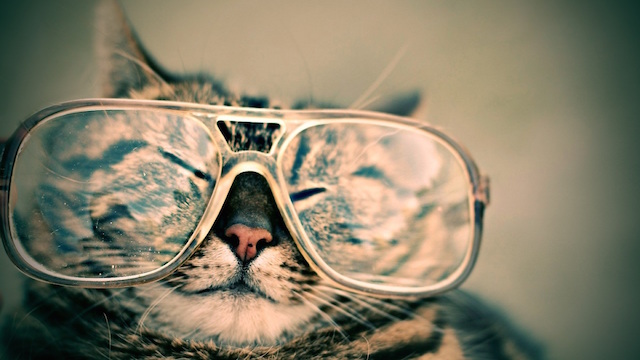All was fine between Mr. Parker and me until he learned how to turn on the radio.
You see, Mr Parker is a 25-pound tabby with luminous yellow eyes. I adopted him from a Petco in a moment of cat-longing. All was peaceful between us until that bone-chilling February midnight a year ago when he showed himself capable of not only turning on the clock radio near my bed, but also of how to select a few favorite radio stations. Music stations only, if you please.
For cat owners or for those who want to be cat owners, this is important. You must realize that your cat is a two-year-old who will always be a two-year-old. As the adult in the family, we must learn to roll with the punches, find out what our cat likes and does not like and go with it.
A cat is not a dog, living only to please its master. A cat is a cat, caring first for what is important to him or her. So Mr. Parker’s love of music had to be accepted without reservations.
I’d actually adopted two cats from the neighborhood Petco the same day—Mr. Parker, named so by me after the tiger in Yann Martel’s The Life of Pi, and Miss Cleo, also named by me, for no other reason than than that I liked the name.
They were both in the same cage, under the glaring Petco lights, and while Mr. Parker was obviously the more noticeable of the two—Ms. Cleo, also a tabby, was and remains half his size—the idea of leaving her behind was against my religion, which is basically cat.
Miss Cleo proved incredibly warm, gentle and, above all, obedient. Mr. Parker, on the other hand, proved incredibly standoffish, rambunctious, even rebellious.
But I was undaunted because I have plenty of cat credentials. I was four when my grandmother gave me my first cat, Benjamin, a tuxedo who never made it home. In a fit of fright, he jumped out of my parents’ car a only few blocks from grandma’s house. I was devastated as I watched Benjamin race down a crowded Brooklyn street, never to be seen again.
I did better with other cats. There was the white cat who was unable to have kittens, and so stole one from another litter. She came into our home in Rockaway Beach, Queens, one day with a tiny baby cat in her mouth. I was in awe at the power of her mother instinct and loved her for it.
Then there was Georgia Peaches, actually a male. He lived to be almost 25 years old, and I was heartbroken when he died.
There was Mr. Jiggs, a female I found in a parking lot, painfully thin, malnourished and cross-eyed, with a hard lump of some type on her spine. I could not turn away. A vet said she had been shot by a BB gun. He removed the projectile. The crossed eye was the result of poor nutrition. I got her shots, a bath, and medication, and took her home. We became so close that one time, when I was to go on vacation, I took her to a boarding kennel. When she was put into a cage, a lump formed in my throat that I could not get rid of. I managed to drive away, but quickly turned around and took her out. I had a neighbor watch her for the weekend.
Mr. Jigg’s death hit me hard. But soon after, to relieve my grief, my then-wife brought home a kitten, all black except for a splash of white on her upper chest as if someone had painted it on her. Prince Matchobelli (my family and I knew the spelling was off, but we all liked the big round O because the cat had a big round belly) was with me through divorce, several changes of residence and more than one cold Thanksgiving when no one else was around to share the turkey and stuffing.
Although you may think a cat cares nothing for us, we must understand the nature of the cat: he or she does care, only the way the cat shows concern is different than the way a dog may show concern. This is key to cat ownership: you will fail with any cat who you expect to act like a dog. The way a cat shows concern, or love, is through his or her eyes. A cat will blink at you to exhibit his or her expression of love and caring. Look for this sign in your cat. If you never see it, take it as a sing that something is wrong in your relationship with your feline.
But all of my history with cats had not prepared me for Mr. Parker and his love of the radio, and classical music.
The first time I heard the radio turn on in the middle of the night, I shot up in a panic, my mind racing. At first, I thought a burglar had broken in. I was breathing fast as I looked about the dark room. When my eyes finally adjusted, I saw Mr. Parker standing on the little bedside radio, his large tail waving happily.
A soothing Mozart piece drifted across the room. Mr. Parker stared at me, waiting to see if he would be punished for disturbing my sleep. How could I punish him? It was a cat thing to do, I reasoned, and it would not happen again because Mr. Parker had just gotten lucky and managed to place his white paw on the power button.
Or so I thought.
The next night I climbed into bed, having completely forgotten the incident. Soon I was dreaming, when I again heard music drift from the radio. I sprang up, switched on the night light, and there was Mr. Parker, his white paw on the power button. He seemed to sport a grin. This time there was no doubt this was an intentional act.
I admit, I was angry, but also amazed. This was a first, as far as I knew, for a cat.
Logically, his talent should not have surprised me. Mr. Parker had figured out that, when his paw hit a red button, sound came out of the radio—a sound that got me out of bed. And that’s all he wanted. I discovered that it was not hunger that fueled his talent. There was food and water for him in the kitchen.
He simply wanted my companionship.
The following night, I took a precaution. I turned off the volume. He could push on that red button all he wanted, and it would make no noise. I pretended to sleep, but kept one eye open and focused on the radio. As usual, Mr. Parker jumped up on the nightstand and put his paw on the right button. Nothing happened. He fiddled a bit without success. I’d gotten the best of him.
Or so I thought.
But after a few nights of poking and jabbing, he managed to find the volume dial. In the middle of the night, I heard a blast of rock music, that shook both of us.
On later nights, he decided talk radio was not for him. He liked classical music. He would turn the dial until he heard the haunting strains of Mozart or Bach. (I must admit I share his love of Mozart.)
I realized I had a serious problem. I had a cat that knew not only how to turn on the radio, but also how to adjust the sound, if need be. If there was an upside, I thought, it was that we both liked classical music. Neither Mr. Parker nor I had any use for the maniac late-night ramblings of the talk-shows. As soon as he heard voices instead of music, he would fiddle with the dial until he heard some strings or flutes, saxophones or bassoons.
I know I could have unplugged the radio altogether, but I would not have been surprised if he would then learn how to re-insert the prongs into the wall.
But most of all, I was growing to like our musical midnight interludes.
There are, to be sure, worse things a cat can do, such as furniture-clawing, peeing on beds, tipping pictures off tables.
A free-willed cat embodies everything we relished being and doing in our own formative years. As children, we lived to both please and annoy our parents, make a lot of noise, get attention and, most of all, enjoy life. A cat wants what we want: to be appreciated, given what he or she wants to eat and drink and a warm place to sleep, probably right beside us.
I call on new cat owners, cat owners who believe they are having trouble with their cats, and those who want to share their lives with a cat:
Keep in mind a valuable lesson cats taught me years ago: you are not the master of the house.
The cat isn’t either.
You are co-habitators.
Remember, the cat has to learn what he or she can and cannot do, but you must also learn the same thing. An example: cats don’t like to be touched constantly. A dog may love this. But a cat wants some space and, often, solitude. So skip the grabbing.
A cat likes a clean litter box. Don’t you like a clean bathroom? Do yourself and your cat a major favor: change the litter twice a day.
A cat does not like to eat the same thing day in and day out. Do you? Buy different types of cat food—fish, meat or chicken.
Cats don’t care to be disturbed when they sleep. I’ll be willing to bet you don’t either. So when you see kitty snoozing, you many may be tempted to rub him or her. Don’t. The cat will let you know when it’s okay to rub.
The greatest cat lesson of all—a cat is a living being, with feelings, worries, highs and lows, just the same as us. Learn to accept that the cat will not always do what you want or be where you want or act the way you want. I’ll bet your children don’t. Don’t expect your cat to act like a programmed robot. You can have the most wonderful time with your cat, if you bear in mind that he or she, is a spiritual entity put on this Earth, just as we were, for a reason. Let him or her fulfill their mission, just as you do yours.
Mr. Parker’s thing happens to be music. Who can say that he was not a great composer or musician in a former life? I do believe he is thoroughly enjoying his time on Earth with me.
And what is life without music, no matter the hour? As far as I know, listening to Mozart never caused anyone any pain.
But life without a cat? Now that would be painful.
~
Author: James Bernstein
Image: Unsplash/Octavio Fossatti
Editor: Ashleigh Hitchcock












Read 0 comments and reply